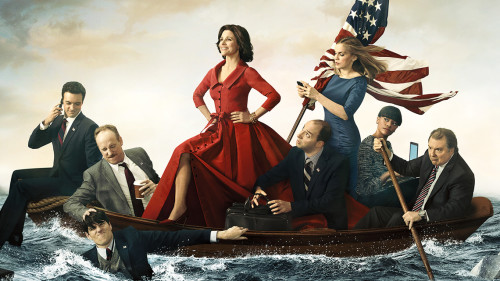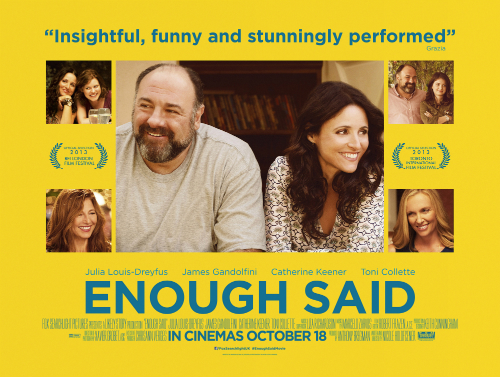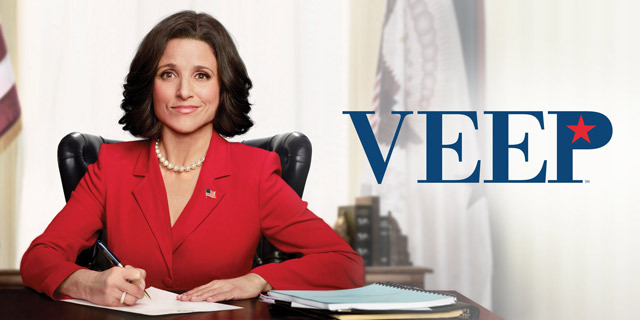
This guest post by Shannon Miller appears as part of our theme week on Masculinity.
As a person who has experienced her fair share of toxic work environments, I’m not sure how much I’d flourish as a member of Vice President (or President, depending on which season you’re watching) Selina Meyer’s staff. Between the terrible communication, almost complete absence of solidarity, and the revolving door of insults, I’m just not sure I possess the thick skin needed to remain there for the long haul. VEEP, however, does an excellent job of presenting this tumultuous atmosphere in a way that’s sharp, thoughtful, and uniquely hilarious.
The component that makes the show the award-winning masterpiece that it deserves to be is its brand of insults, which are hurled by all members of the staff with an almost enviable ease. They’re often as witty as they are vulgar and everyone is a potential target, including Meyer (flawlessly portrayed by Julia Louis-Dreyfus) herself. The wealth of colorful jabs and hostile language offer more than a momentary laugh; it alludes to what is considered valuable amongst both the Meyer camp and politics, in general. Efficiency, aplomb, aggressiveness, and general competence are regularly encouraged with a simple call to “man up.” In addition, femininity and boyhood are used as favorable taunts to either attack someone’s confidence or goad them in a more advantageous, perhaps much more effective direction.
Consider, for a moment, a recent episode titled “B/ills” where Meyer advises her exceedingly charming running mate Tom James (Hugh Laurie) during a mock debate. “You’ve gotta be aggressive,” she says frankly. “Man up here a little bit.” Or we could glance back at season two’s “Hostages” when she gloats about her elevated role in the White House, or acquiring “a bigger dick.” During that same season’s episode “Signals,” Meyer’s secretary Sue Wilson (played by the underrated Sufe Bradshaw) demands Mike McLintock (Matt Walsh) to “man up and prioritize” when he expresses difficulty asserting himself enough to maintain the VP’s tight schedule.
The references are typically blink-and-you’ll-miss-it quick due to the show’s speedy pace, but the language that they use in lieu of a simple “be assertive” or “ I have more leverage” is seemingly purposeful. Within the VEEP world, assertiveness and power – necessities when working in politics – are directly equated with masculinity. Politics, generally speaking, is a male-dominated field, so this notion isn’t exactly revelatory. Something I find interesting, however, is how frequently this equivalency is perpetuated by the women in this show as opposed to the men. Meyer, Wilson, and Chief of Staff Amy Brookheimer (Anna Chlumsky) are three of the most competent, self-assured characters throughout the series. In my opinion, they seem like women who would rightfully push back against the idea that the attributes that make them exceptional are somehow inherently male. Instead, they’ve managed to integrate this concept into their workplace lexicon. It shouldn’t be said that they’re anti-femininity; in fact, they celebrate the fact that they are successful women. Their approaches to maintaining this success, however, have a surprisingly macho influence. Those who may not adopt quite the same attitude could find themselves on the receiving end of a sharp-witted taunt, like Meyer’s loyal personal aide Gary Walsh.

Some might argue that Walsh (Tony Hale) has one of the most difficult jobs in Washington D.C. He literally maintains the Vice-President-turned-President’s entire public image, from the shade of her lipstick to the centerpieces at her dinners. He, on a superficial level, is responsible for making sure Meyer is always presentable, hauling around wardrobe options and a large bag laden with everything needed to keep every follicle in place. More importantly, however, he’s tasked with knowing the names and personal backgrounds of every single bureaucrat, dignitary, and public figure in her path. Almost permanently stationed close to her ear, Walsh is ready to dispatch any necessary information in order to help her exchange necessary pleasantries and maintain a relatively polished impression. Without him, many of her (and, by extension, the country’s) productive relationships would falter before her first syrupy sweet “hello.”
The complexities of his position, however, are widely overlooked as his role is diminished to that of a bag carrier by nearly all of his coworkers, including his boss. The precedent for this treatment is set from the pilot episode when Brookheimer and Dan Egan (Reid Scott) tease him for referencing his bag as “The Leviathan” and remains as an undercurrent throughout the entire series. Because he doesn’t display the same aggressive temperament (he’s actually rather sweet and nurturing) nor does he have a similar function as the rest of the group, his value is regularly questioned and his masculinity is nearly erased. Walsh broaches this issue in the second episode of the series, “Frozen Yoghurt,” when Egan flippantly claims that the famous bag is full of lip balm: “Everything you say to me is emasculating.” And it’s true! The core staff doesn’t see him as a contributor in the same way that they see themselves, so he’s routinely referred to as a woman or a young boy under the impression that both are hefty insults. In “East Wing,” for example, Brookheimer warns him that “his inner child needs to grow an outer man” when he dared to fret over a major mistake. The same could be said, in a way, about the treatment of White House liaison Jonah Ryan (Timothy Simons), who Sue Wilson jokingly claims was in his mother’s womb until he was 15 years old (“Shutdown”). His confidence and enthusiasm for his position are habitually met with an insult that demotes him to a young boy. It could also be said, however, that his immaturity manages to do that, as well.
So, given this fictional administration’s heightened perception of masculinity, how does the show manage not to wildly offend me, a woman and vocal feminist, every Sunday night? It’s simple: VEEP’s depiction of the way the political world values men while consistently undermining women aligns with real life, albeit comically. Female political figures are too often subjected to sexist criticism from the general media, which tends to focus on their hair accessories more than their actual societal contributions. If a woman announces her interest in any sort of office, an immediate question arises as to whether or not she is emotionally stable or focused enough to do the job. It’s no wonder why Selina Meyer would rather not bring too much attention to the fact that she’s a woman when suddenly tasked with stating her stance on abortion (“The Choice”); given the political media’s repulsive proclivity to not take women seriously, how else can she get the public to focus on the actual issue at hand? Her and her staff’s collective attitude regarding masculinity in the workplace is imbued with the discrimination that professional women – especially those in politics – have always experienced. Like many other magnificent comedies, the raucous laughs that come with VEEP can also be indicative of a sad, frustrating reality.
Shannon Miller’s passions include bossy women, social justice and her two-year-old daughter’s version of “Let It Go.” She’s also unapologetically anti-raisin. You can read her thoughts regarding representation in media on her blog Televised Lady Bits or follow her on Twitter @Phunky_Brewster.























